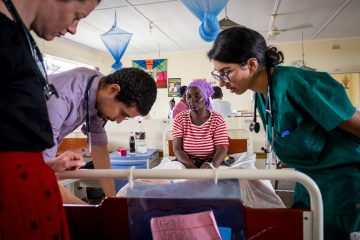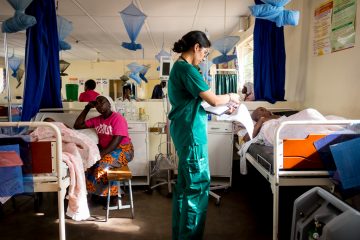-
Theatre
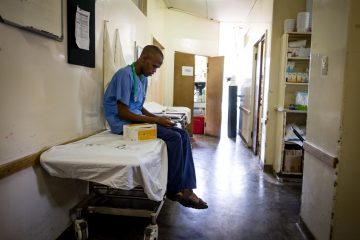 Performs a variety of major and minor procedure. Common ones
Performs a variety of major and minor procedure. Common ones- Scrubs – theatre staff prefer if you bring your own scrubs to change into or wear their scrubs. Scrubs worn outside of the theatre are not allowed in. Same goes for shoes but there are always shoes to wear there and gloves to use.
- Anesthesia – performed by nurse anesthetists. Commonly use spinals, ketamine, local, nerve blocks and GA if really necessary.
- Separate theatre for C/S in maternity. They have scrubs and shoes there.
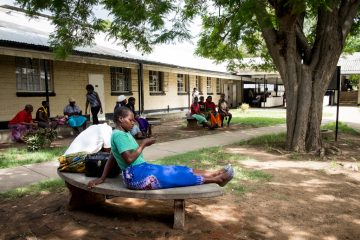 Good idea to bring your own scrub cap and eye protection. Had masks include suprapubic prostatectomies, orchidectomies, hernias, I+Ds, debridements, fracture reduction and care, minor excisions, cervical biopsy, endometrial biopsy, VP shunts, hardware removal.
Good idea to bring your own scrub cap and eye protection. Had masks include suprapubic prostatectomies, orchidectomies, hernias, I+Ds, debridements, fracture reduction and care, minor excisions, cervical biopsy, endometrial biopsy, VP shunts, hardware removal.
-
OPD – Out Patient Department
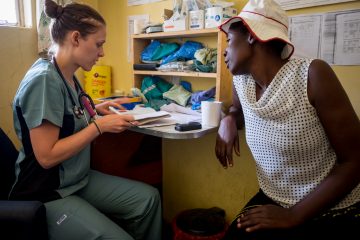
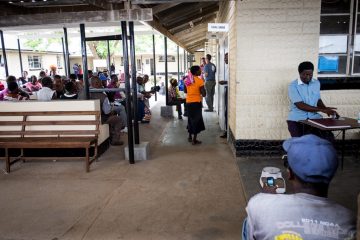 Functions as a general family practice clinic to acute emergency presentations, however really sick patients go straight to the ward. Admissions occur through OPD or you may get called to the ward to do an admission.
Functions as a general family practice clinic to acute emergency presentations, however really sick patients go straight to the ward. Admissions occur through OPD or you may get called to the ward to do an admission.- Nurses take history, vitals and triage. Nurses are trained to diagnose and treat so not all patients have to see the doctor.
- Medical students are paired with preceptors and Residents may use a translator and work independently if comfortable.
-
Ward – Female and Male
-
Maternity
- Midwifery students present to do most of the deliveries so it’s difficult to get in on them
- Postpartum wards in same building. Separate blocked off space for pregnant women from far communities that wait for delivery
- Nursery for sick babies with incubators
- Doctors involved in neonatal resus, labour complications and C-sections.
-
Other departments
- Peds
- CFD – child and family department
- Antenatal, postpartum, and well child up to 5 years including immunizations
- VIAC – visual inspection of the cervix under acetic acid (this replaces PAP for cervical screening. Results are read by a Dr and treatment is initiated immediately, as PAPs are difficult to follow up with in this population)
- Physiotherapy
- Lab
- Would recommend setting up a time to go tour the lab and look at slides of malaria and Tb
- Pharmacy
- Radio station
- Dr Thistle
- Has his own office with an U/S and sees mostly womens health/gyne related problems.
-
Scheduling
- Monday through Thursday 0700 -0715: devotions in conference room
- 08:00 – rounds, in guesthouse. Fridays devotions are done in the radio station and broadcasting to all of the patients. Fridays is not necessary to attend but it is encouraged to attend during the week.
- Rounds work best if the group splits into teams including doctors, residents and students. Go to OPD and ask Mr. Chim for translators to assist each team. Rounds are done in maternity including postpartum and the nursery, female ward,peds, and male ward. Usually end around 10.
- 10:00 – 10:30 – tea time.
- 10:30-13:00 – there is no set schedule once rounds finish. Options for students/residents include:
- Following up with patients on the ward. Sometime small procedures like LPs need to be completed.
- OPD
- Theatre – either scrubbing into the major procedures or performing minor procedures with or without assistance.
- Maternity – only observation of delivery is usually allowed due to the midwifery students.
- Visiting the other departments
- 13:00-14:00 – lunch
- 14:00-17:00 – Same as point d.
- Sunday morning 10:30 – church service. Expect to be here for 2-3hours
-
Common conditions to read up on before coming to work
- TB
- HIV – referred to as ISD (Immuno Suppression Disease)
- Cryptococcal Meningitis
- Schistosoma
- Fractures
- Soft tissue infections/abscesses
- Female – Cervical Cancer
- Male – BPH, Prostate Cancer
- Peds – hydrocephalus, FTT, malnutrition
-
Common Medications
- Chloramphenicol – own class, very broad spectrum
- Cotrimoxazole – used for PCP prophylaxis
- Rocephin – ceftriaxone
- Praziquantel – schistosoma
- Diflucan – cryptococcal meningitis
- Promethazine – anti-emetic
- Pathadine – analgesic (aka Demerol)
- Other Ab commonly used – benzylpenicillin, metronidazole, doxy, i. EDLIZ book is a great resource for Zim treatment protocols (many are different from ours), it is available on the internet. 2011 is recent version.
-
Investigations available
- Labs
- FBC – full blood count
- LFTS and renal function/electrolytes (sometimes)
- Type and crossmatch
- U/A – no C+S
- Stool O+P
- VCT – HIV test (Reported as VCT 0 – negative or VCT 1 – positive)
- CD4
- CSF analysis
- RDT – rapid bedside malaria test. (Only tests for P. Falciparum)
- Blood smear for malaria
- Sputum – Tb
- GeneXpert – Tb (PCR + resistance), HIV viral load
- RPR – syphilis
- Imaging
- Xray
- Portable U/S in theatre and Dr. Thistle has U/S in his office (Mostly OB stuff)
- Labs
-
People
- Doctors
- Helpful people
- Dr. Spencer Mumvura – the national doctor. Does a bit of OR and mostly OPD
- Dr. Paul Thistle – OB/GYN + Everything else. This guy runs the place
- Kierstan Hutchingson – physicans assistant. Functions as a GP
-
Dress
- Women wear skirts below the knees and tee-shirts or long-sleeved
- Men wear pants and a shirt around Karanda
- You may wear work clothes or scrubs (green) around the hospital
- You can generally wear whatever you want inside the guesthouse
-
Things to do around Karanda
- “The airstrip” (Take the path out the gate on the west (uphill) side of the property)
- Running (wear a scarf around leggings for ladies)
- Shops and food out the main hospital gates
- Restaurants that serve Sadza (traditional meal of maize meal, meat and veggies)
- Stores where you can by pop, cookies, chips, basic toiletries etc.
- Ladies sit outside the front gates and sell pop, freezies, fruit and airtime to load onto your phone
- A lady comes to the guest house on Tuesdays around tea time selling vegetables and fruit
- Bring chicken, maize meal, tomatoes, onion, greens, oil, salt, Usavi powder (packets, can find them in the stops at Karanda), Rice, tea or sugar or some other token of your appreciation to leave, and you should be able to find a local at Karanda or in the nearby villages to show you how to cook Sadza
-
Phone
- You can buy a Zimbabwean SIM card for $1 to use in an unlocked phone, then load minutes at an EcoNet store, or you buy airtime coupons from the EcoNet stand by the shops or from ladies wearing neon orange vest outside the front gates
- International calling is USD$0.50/minute, texting is USD$0.12
- You can buy both airtime and data, or you can buy airtime and convert it to data on your phone
-
Internet
- Go to the Administration office at Karanda with your device
- Cost is USD$5/week for wifi
- Connection is patchy, but is generally fairly strong in the Convention Centre side of the guest house. If you can’t connect wander around until you pick up a signal.
- The wifi is slow and is only functional for email and texting. It is not useful for web browsing, Skype or FaceTime.
Service
Global Health Initiative Workshops
Nigeria Malaria Control Project
Ghana Medical Help Project
UBC Nepal Sexual and Reproductive Health Project
Malawi BICO Global Health Project
International Disaster Medicine Simulation Exercise Program
Solar Technologies India
Planetary Health Curriculum Integration Project
Nepal Health Education Partnership
India Spiti Health Project
Kenya PCT Project
Nepal Sickle Cell Disease Project
Taiwan Comparative Health Systems Program
Bhutan Health Project
Climate and Environmental Health
India Voice of Children Project
Uganda ACCESS Project
Soroti Children's Project
Canada Inner City Community Project
Uganda Brighter Smiles Project
Honduras Health Project
